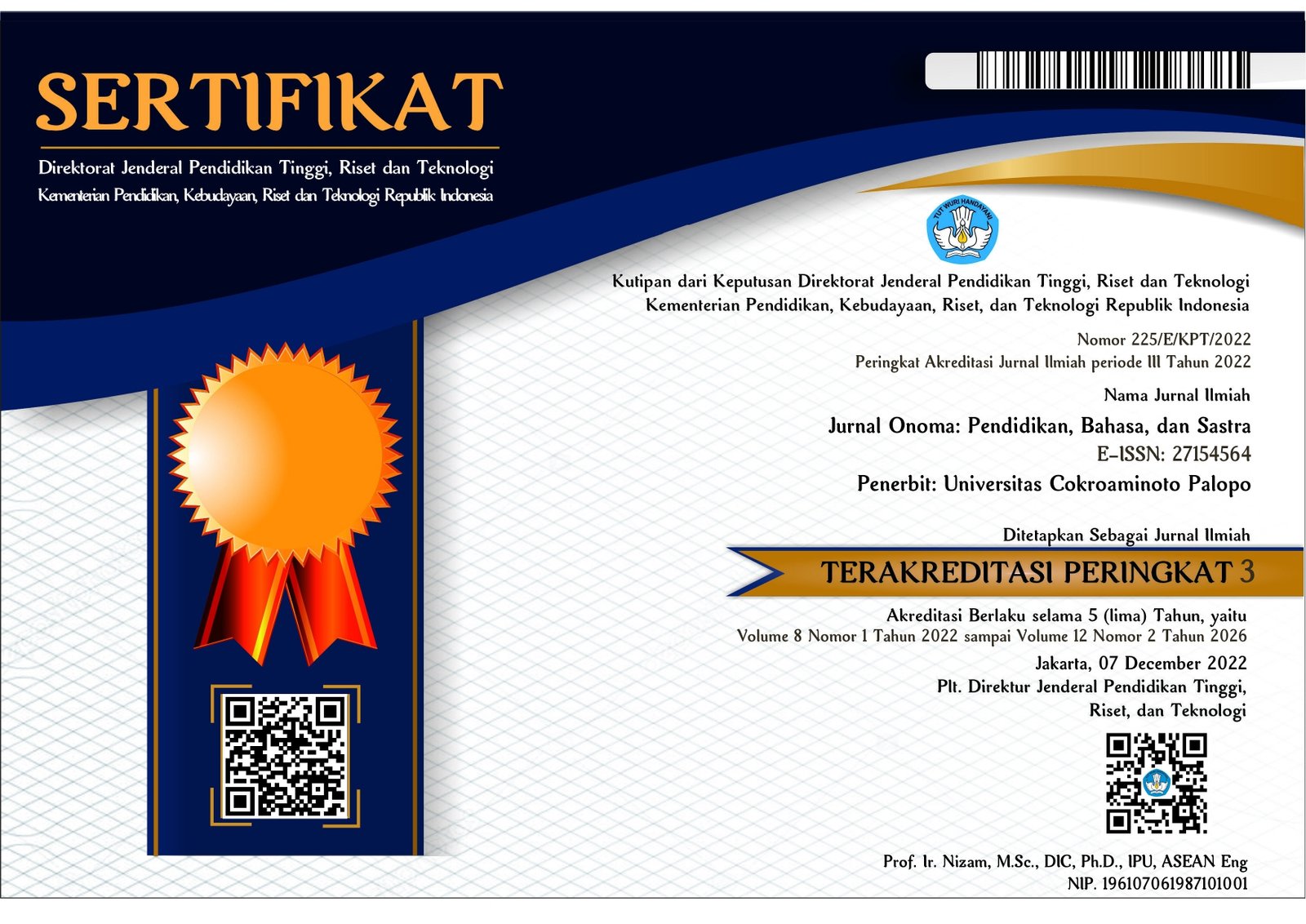Berpikir Kritis dalam Skripsi Mahasiswa
https://doi.org/10.30605/onoma.v7i1.572
Keywords:
berpikir kritis, skripsiAbstract
Penelitian ini bertujuan mendeskripsikan berpikir kritis dalam skripsi mahasiswa berdasarkan aspek interpretasi, analisis, dan inferensi. Berpikir kritis dipilih sebagai topik penelitian ini karena dianggap penting dalam penulisan skripsi agar siswa tidak hanya sekadar memahami, tetapi juga ikut menyumbangkan gagasannya untuk memberikan solusi dalam mengatasi sebuah permasalahan. Teks editorial dipilih karena saat menulis teks editorial dibutuhkan daya pikir yang kritis dan kreatif untuk menyampaikan pendapat atau argumen penulis tentang permasalahan yang aktual kepada pembaca. Oleh karena itu, penelitian ini menggunakan pendekatan kualitatif dengan desain penelitian studi dokumen. Data penelitian ini berupa paparan verbal tulis yang megandung aspek interpretasi, analisis, dan inferensi. Sumber data penelitian ini yaitu skripsi mahasiswa STKIP Prima Sengkang. Prosedur pengumpulan data penelitian ini menggunakan studi dokumen. Pengumpulan data dilakukan dengan mengidentifikasi data yang layak diteliti, merekam data ke dalam tabel penyajian data, dan memberikan kode pada masing-masing data. Instrumen utama dalam penelitian ini adalah peneliti sendiri dengan dibantu intrumen tambahan berupa panduan analisis data. Kegiatan analisis data dilakukan dengan reduksi data, penyajian data, dan penarikan kesimpulan. Hasil penelitian ini sebagai berikut. Pada aspek interpretasi ditemukan beberapa judul yang memiliki kemiripan, hanya yang membedakan waktu dan tempat.
Downloads
References
Baihaqi. MIF. 2014. Pengantar Psikologi Kognitif. PT. Refika Aditama: Bandung.
Bastuq, dkk. 2017. A phenomenological research study on writer’s block: causes, processes, and results. Emerald Publishing Limited, 59(6), 605-618.
In’am, A. 2014. The Implementation of the Polya Method in Solving Euclidean Geometry Problems. International Education Studies, 7(7), 149-158
Imam, S. 1988. Retorika dalam Menulis. P2LPTK: Jakarta.
Karatas, 2013. The Effect of Learning Environments Based on Problem Solving on Students Achievements of Problem Solving. International Electronic Journal of Elementary Education, 5(3), 249-268.
Kuswana, W.S. 2014. Taksonomi Kognitif. PT. Remaja Rosdakarya: Bandung.
Marzano, R.J.& Pickering, D.J. 1997. Dimensions Of Learning. MREL: United States of America.
Molan, B. 2012. Logika (Ilmu dan Seni Berpikir Kritis). PT. Indeks: Jakarta.
Nurhadi. 2017. Handbook of Writing. Bumi Aksara: Jakarta.
Santrock, JW. 2017. Psikologi Pendidikan. Salemba Humanika: Jakarta Selatan.
Subekti, S. 2018. Mencetak Generasi Cerdas melalui Berpikir Kritis. CV. Cipta Media Edukasi: Surabaya.
Sultan, N. 2013. Can academia help improve the writing skills of tomorrow’s professionals. INDUSTRY & HIGHER EDUCATION,27(2), 139–147.
Rani,Abdul, dkk. 2010. Analisis Wacana; Sebuah Kajian Bahasa dalam Pemakaian. Malang: Bayu Media Publishing.
Zetriuslita, A. R., & Nufus, H. 2016. Students Critical Thinking Ability: Description Based on Academic Level and Gender. Journal of Education and Practice, 7(12), 154–164.
Downloads
Published
How to Cite
Issue
Section
License
In submitting the manuscript to the journal, the authors certify that:
- They are authorized by their co-authors to enter into these arrangements.
- The work described has not been formally published before, except in the form of an abstract or as part of a published lecture, review, thesis, or overlay journal.
- That it is not under consideration for publication elsewhere,
- That its publication has been approved by all the author(s) and by the responsible authorities – tacitly or explicitly – of the institutes where the work has been carried out.
- They secure the right to reproduce any material that has already been published or copyrighted elsewhere.
- They agree to the following license and copyright agreement.
License and Copyright Agreement
Authors who publish with Onoma Journal: Education, Languages??, and Literature agree to the following terms:
- Authors retain copyright and grant the journal right of first publication with the work simultaneously licensed under Creative Commons Attribution License (CC BY 4.0) that allows others to share the work with an acknowledgment of the work's authorship and initial publication in this journal.
- Authors are able to enter into separate, additional contractual arrangements for the non-exclusive distribution of the journal's published version of the work (e.g., post it to an institutional repository or publish it in a book), with an acknowledgment of its initial publication in this journal.
- Authors are permitted and encouraged to post their work online (e.g., in institutional repositories or on their website) prior to and during the submission process, as it can lead to productive exchanges, as well as earlier and greater citation of published work.

















